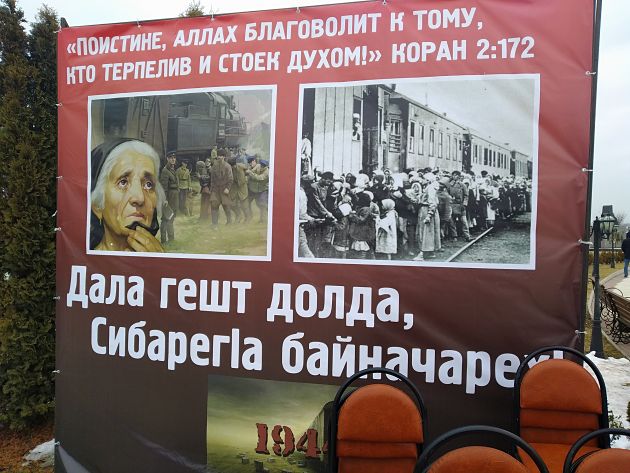If for the Sovietized part of the population of Russia, as well as for many other post-Soviet states, February 23 is “Defenders of the Fatherland Day”, then for conscious Vainakhs and those in solidarity with them, Muslims, and people of good will of all nationalities, this is primarily a day of tragedy for the Chechen and Ingush peoples, their mass deportation in 1944. Considering the fact that during this deportation a huge number of people (according to some reports up to half of those deported) perished in winter, in freight cars, in the frozen steppes of Kazakhstan, there is no need to repeat what it meant for these peoples. Especially in view of a separate page of this history – the burning alive of several hundred Chechens by the NKVD troops in the highland village of Khaibakh. It is extremely important for the Vainakhs, who keep this memory (and it is difficult not to keep it, since these events affected every family), that they be allowed to commemorate their tragedy on this day, without imposing an unnatural holiday for them – the army that essentially deported them from their lands and 50 years later rained bombs, shells and mines on the heads of the Chechens.
The rally to commemorate the 76th anniversary of the deportation, which took place yesterday in Nazran, gave rise to cautious optimism in this regard. Yes, the rally was strictly official, representatives of the independent Ingush community were not given a voice, and the venue was cordoned off by numerous law enforcement officers and their vehicles, with drones providing surveillance. But, as observers noted, unlike the previous head of Ingushetia, Yunus-Bek Yevkurov, who combined the commemoration of the victims of the deportation with the celebration of the holiday of those who deported them, the new head, Mahmud Kalimatov, had the tact to separate one from the other.
For the first time in many years, the official commemoration rally was precisely a commemoration rally, without the sound of festive-patriotic slogans. Moreover, there were no foreign customs, such as Muslim cultural traditions of laying wreaths, music, orchestras, and so on. One of the established posters even contained a quotation from the Koran (see photo).
Of course, the “Defender of the Fatherland Day” did not disappear without a trace – its celebration was organized on another platform. Well, at least that. In neighboring Chechnya, Ramzan Kadyrov had already established such a division – he even moved the commemoration of the tragedy to February 22, sacrificing February 23 in favor of the official Soviet-Russian holiday.
In any case, it is obvious that the local authorities are forced to make such maneuvers under pressure from both sides, because despite the Kremlin’s demands to educate the Vainakhs as loyal subjects of the former Soviet state, Russia, both Ingush and Chechens remember who they really are and what this day means to them.

